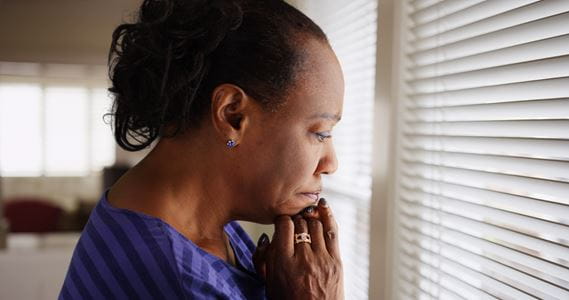Sophia Wang, MD, assistant professor of clinical psychiatry in the Department of Psychiatry at Indiana University School of Medicine, sat down to discuss some important topics surrounding Alzheimer’s disease, future research and the importance of caregivers seeking help.
The difference between aging and Alzheimer’s disease
A common misconception is that the memory changes associated with Alzheimer’s disease are part of normal aging. “It’s important to recognize that cognition does change as we age. However, those changes are a different process than a neurodegenerative disease, such as Alzheimer’s disease,” Wang said.
“People who do not have Alzheimer’s disease or other dementias may even see improvement in certain cognitive skills, such as vocabulary or wisdom, as they get older. So, it’s not all decline as you age.”
On the other hand, people may experience decline in certain cognitive skills, such as processing speed. While age-related cognitive changes remain a major area of active research, studies suggest that changes in the white matter in the brain may be one reason that people notice a difference in their processing speed as they age. Changes in processing speed can result in older adults taking a little longer to come up with information. While these changes may be frustrating, they are different from the changes seen in Alzheimer’s disease, which eventually causes functional decline.
Viruses: a promising new avenue for treating Alzheimer’s disease?
One of the most exciting areas of research currently in Alzheimer’s disease is the idea that microbes, particularly viruses, may have a crucial role in neurodegeneration. Studies of human brain tissue suggest that Alzheimer’s disease may be specifically linked to certain viruses, most likely acquired during early life.
Additional research is needed to understand why certain people who are exposed to these viruses develop Alzheimer’s disease. One possible explanation is that as people age, their ability to fight infection lessens. This may predispose individuals to having the viruses replicate, even if there are no physical signs of an infection. This increase in certain viruses may somehow promote the deposition of beta amyloid, one of the hallmark proteins associated with Alzheimer’s disease. More studies are needed, however, to determine whether treatments directed towards viruses may be a promising cure for Alzheimer’s disease.
Supporting caregivers
Family members caring for their loved ones with Alzheimer’s or related dementias need education and psychological support. Although clinicians can provide medications to alleviate psychological symptoms for patients, the first line treatment for these symptoms in patients with Alzheimer’s disease is behavioral management. Providing behavioral management, however, is a major burden on the caregivers and family.
“Initially, Alzheimer’s disease affects memory,” Wang commented. “Often, there are not any obvious physical changes in early stages of Alzheimer’s disease. So it can be very strange interacting with someone who appears to be the same person you’ve known forever. Only when you interact with them do you realize that person has changed.”
Caregivers need to seek guidance and help from resources available to them from national and local organizations. From getting legal advice and financial tips to understanding current research, having awareness in these areas could provide a strong foundation that can support their loved ones and family for years to come.
Apathy and burnout
Many caregivers experience “burnout,” a state of emotional, physical and mental exhaustion. This can develop from the high demands of caring for a loved one experiencing Alzheimer’s or other dementia. Caregivers are particularly affected by sleep cycle reversal, in which their loved ones will be awake at night but asleep during the day. Another major cause of burnout for caregivers and families is apathy. When a loved one sits quietly for hours while staring vacantly, this creates an emotional challenge for caregivers and family members.
“It can be a strong disconnect because we, as people, relate to each other through our relationships and interactions with one another,” Wang said. “To have that relationship negatively impacted or taken away can be very jarring for caregivers, so it’s crucial to offer them tools to navigate that difficult transition and develop a resilience to handle that hardship.”
Local chapters of the Alzheimer’s Association provide countless resources for caregivers and their families. In addition, each September the Indiana Alzheimer Disease Center at IU School of Medicine provides a caregiver symposium for Hoosiers to come for a day of learning and engage with subject-matter experts.
Learn more about current research in Alzheimer’s disease.
